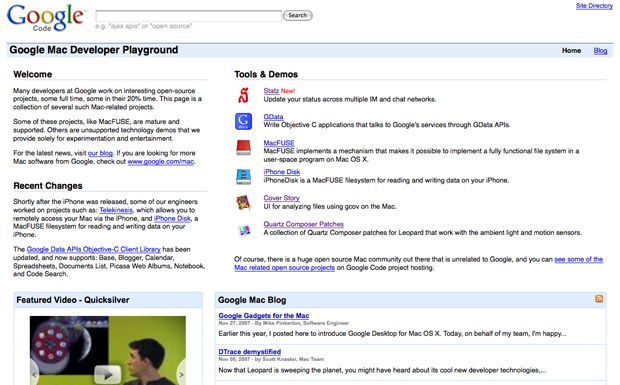Jul 24

As you can see, you can now attribute the content that goes with your open source project on Google Code.
This is a piece of news that won’t make TechMeme, but I believe it is actually a big deal (even more so than Robert Scoble blogging about blogging).
We often think of opensource projects as code. We think about the licensing of that code, and how important it is. Tell a developer GPL vs. BSD and they know the general rules.
That is great, but few projects only contain code. What about the artifacts? What about documentation, and samples in articles, and screencast movies, and protocols and formats? A good project will clearly define that area too, but the open source licenses don’t fit.
On Google Code, you can now select a content license that fits your project. A small thing, but an important one, as you yet again tell all of the users and developers of the project exactly what the rules are…. explicitly.
Dec 04
Today, I was able to launch a new section of Google Code that is focused on open source code related to the Mac. Since I am passionate about both open source AND the Mac, it was a really fun little side project to work on.
The core Google Mac team, and other developers at Google, actually have a fair amount of Mac related open source code. From small pieces of helpful code such as the Quartz Composer patches for Leopard, to large projects like MacFUSE to fun tools like iPhoneDisk to a new meta status updater called Statz. This is just the beginning of course, and now there is a home for this code.
One of the pleasures of working at Google is the slew of great people that you get to meet. On this project it was a real pleasure to work with Amit Singh (MacFUSE and much more), Nicholas Jitkoff (Quicksilver), and Dave MacLachlan (Adobe and much more).

Nov 01
I have seen the Google Code team churning away under the inspiration of DeWitt for some time to get to where we are today. Google Code launched a redesigned site that is so much cleaner and gives developers access to so much more. I love the fact that we both ate our own dogfood, and some open source variety. DeWitt puts it well here where he talks about how we have grown:
One of the most exciting things about the redesign is that everything you see here was built using technology and APIs that are available to everyone. The pages we’re serving don’t rely on any secret back-end tricks; the site is built on plain HTML, JavaScript and CSS, each using our public APIs. In fact, all of the techniques used on Google Code can be duplicated on your own site.
For example, the search results pages use a combination of the AJAX Search API and Custom Search Engines. The homepage gadgets use the AJAX Feed API and Google Reader feeds. The videos are powered by the YouTube API, the blogs by the Blogger API, the events powered by the Google Calendar API, the metrics by Google Analytics, the forums by Google Groups, etc., etc.. And we’re pleased to use jQuery, the wonderful open source JavaScript library (not ours, we’re just fans), to help power each page. Stay tuned — over the upcoming weeks we’ll offer detailed articles and tutorials about how we built the various parts of Google Code using open technologies.
Remember when you would go to a huge list of APIs? Now more takes you a great product page which gives you a lot of context. Search is a first class citizen (which makes sense… Google and all) and you now have great suggestions and a fantastic use of CSE. I can’t wait to show you more of the innards via interviews with the team…. now that they can have a bit of a breather.
The breather won’t last long though, as this just the beginning. When I look at the thoughts for the future I get really excited. Google Code got a lot better today, and will go to a new level soon.
I love launch days :)


